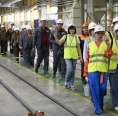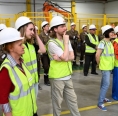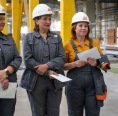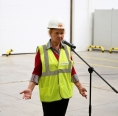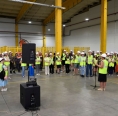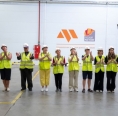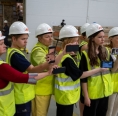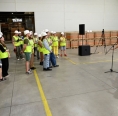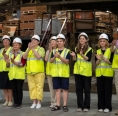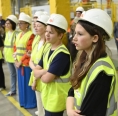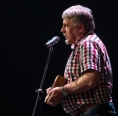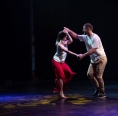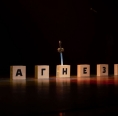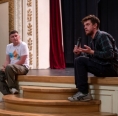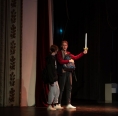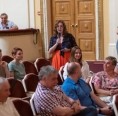-
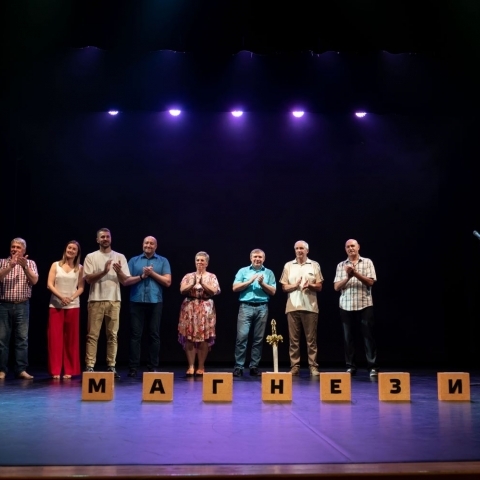
THEATRICAL IMPROVISATION OF “REFRACTORIES” LABORATORY
-
Address:
-
Partners:
The first performance of three scenic sketches created within the directing and dramatic laboratory “Refractories” took place in Satka. The event was held with support from Magnezit Group and the Satka District Development Assistance Fund. The curator of the project is Ivan Minevtsev, the principal director of the Youth Theater (Chelyabinsk).
Company old timers, SPP employees and their children participated actively in the project. The enterprise itself was an integral part of the laboratory.
So, for example, the scenic sketch “Eye of Magnezit”, which was the first one presented to the public, featured Magnezit as a major character whose powerful force, according to the scenic story, protected all ways out of the town for many centuries. The virtual image of the Eye was created by videographic artist Egor Zhernov. Vladimir Komarov, the director of the theatrical production, provided a voice to the fantastic character. Akim and Tanya (whose parts were played by Akim Morozhenov and Tatyana Amineva) who dream of entering the college of theater arts make up their mind to defy the odds, pick a fight with the Eye, and go through all the trials that 8 refractory “guardians” have in store for them. The latter parts were played by employees from Magnezit: Aleksey and Ivan Datsko, Sergey Danilchenko, Marina Martynova, Aleksandr Saburov, Liubov Krylova, Andrey Baranov and Aleksey Gorodov. Taking the stage, they checked whether the guys’ desire to leave Satka and become actors was genuine, whether they were aware of challenges that they might face on their way toward realizing their dream, whether they were ready for them and how they would overcome them. After achieving successfully each task, the characters obtained a refractory with a letter, so that in the end the word “magnezit” was formed on the stage.
- Everything is absolutely correct. “Magnezit” starts with a muse (“m”), and the final letter in this word stands for talents. The enterprise employs many talented people. Moreover, Magnezit provides support to talented young people, as the audience members pointed out during the scenic sketch discussion which was held after the performance.
- Citizens' theater is an interesting phenomenon which can highlight various historical issues and problems of the town. This story is even more interesting, it is about a problem of choice through the prism of the town living. It does not contain any evaluative judgment: whether it is good or bad — to stay or to leave. And the fact is that in the end the boy and the girl separate — he leaves, and she stays. This is how it happens in real life: dreams and desires change, people make different choices, — expressed her opinion Irina Vinterle, the theater critic (Nizhny Novgorod).
Participants of the art performance “Mechanism(s)” proceeded with reflections on the future of the town, on how to make the life of Satka residents more comfortable, vivid, entertaining, how to create such conditions that young people did not feel the urge to seek their fortune in other cities and countries. Director Artyom Tomilov (Saint Petersburg) and playwright Yekaterina Guzyoma (Izhevsk) selected the Impulse Calcination Product Complex as the stage.
Sergey Migashkin, the shift supervisor of the refractory product calcinating section of the product manufacturing department, who controlled the transportation undercarriage operation was the first person to appear from behind the makeshift stage curtain, and after that all other project participants appeared: Marina Timakova, Ksenia Purgina, Ksenia Dodina, Daniil Karasov, Tatyana Zyabkina, Valentina Maradudina, Yelena Panchenko. Firstly, they formed a pattern with their phones where videos were broadcast which the art performance audience members could watch afterwards. It appeared to be that the actors showed places in Satka that were meaningful for each of them, at the same time asking the question: “What do you think should be created to make the town of future?”. And in the main part of the performance, the participants, one after another, stepped up to the microphone and expressed their thoughts about the town, shared their childhood memories or events of their work days, as well as communicated their point of view concerning the things that Satka lacks to make life more comfortable and happy.
The third scenic sketch “AI Superstar” of GPT-opera genre was performed in Stroitel Palace of Culture. Playwright Igor Vitrenko collected the stories told by the factory workers who happen to work in this unique time — in future that has become present at the time when artificial intelligence not only comes to the service of humans but exists on equal terms with humans (in the play it became an animate creature — Ivan Ivanovich).
During the performance, the project team (Alyona Mazovka, Anna Shishkina, Olga Verina, Anastasia Sharova, the play author and actress of the Orlov Drama Theater Anna Kaymashnikova), as well as the audience members came to the following conclusion: even if the artificial intelligence replaced humans in all professional spheres, and people gained the long-desired freedom from their work days, there would be no harmony. The scenic sketch ends with repeated phrases voiced by the artificial intelligence, and gradually its voice tone loses its robotic monotony, and acquires human emotions. The stage light goes down, and the audience members return to real life.
All three productions provided new experience for both the participants, and the audience members. And the laboratory itself became another unique event that was held successfully in Satka. Moreover, theater critics also mentioned this event: Ksenia Aitova and Irina Vinterle stated that such an emotionally and technically complex work had been performed within a very short time, literally a few days, and resulted in an extraordinary combination of professional and amateur performers, various genres and acute issues, which made the scenic sketch an estimable specimen of the modern theater arts.
Source: Magnezitovets.
Photo by: Vasily Maksimov
-
26.08 - 26.08
DIARY OF THE THIRD INDUSTRIAL BIENNALE
-
28.11 - 28.11
MY SATKA FESTIVAL WINS THE CONTEST OF CORPORATE VOLUNTEER PROJECTS
-
13.10 - 15.10
COOPERATION WITH VGIBL NAMED AFTER M.I. RUDOMINO

